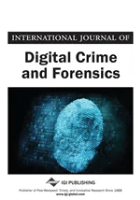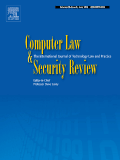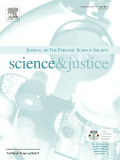
Journal of Digital Forensics Security and Law
metrics 2024
Navigating the Intersection of Technology and Law.
Introduction
Journal of Digital Forensics, Security and Law is a prominent open-access journal dedicated to the rapidly evolving fields of digital forensics, cybersecurity, and legal issues related to digital evidence. Published by the Association of Digital Forensics, Security & Law, the journal aims to create a central hub for researchers, practitioners, and educators to share knowledge, innovative methodologies, and the latest advancements in these interdisciplinary areas. With an ISSN of 1558-7215 and an E-ISSN of 1558-7223, this journal has been serving the academic community since 2013, providing unrestricted access to groundbreaking research that addresses the complexities of security and law in the digital age. The importance of this journal lies in its commitment to enhancing the understanding of legal frameworks and investigative techniques that safeguard digital assets while maintaining compliance with evolving regulations. Researchers, professionals, and students alike will find valuable insights and practical applications within its pages, contributing to the ongoing dialogue surrounding digital forensics and cybersecurity.
Metrics 2024
 -
- 0.60
0.60 0.50
0.50 -
-Metrics History
Rank 2024
IF (Web Of Science)
JCI (Web Of Science)
Quartile History
Similar Journals

Cybersecurity
Shaping Policies and Technologies for a Safer Cyber LandscapeCybersecurity, published by SpringerNature, serves as a pivotal platform in the realms of Artificial Intelligence, Information Systems, Software, and Computer Networks and Communications. With an impressive Impact Factor and an Open Access model initiated in 2018, this journal facilitates widespread dissemination of innovative research findings to a global audience. Based in the United Kingdom, Cybersecurity aims to advance knowledge and application in security innovations, risk management, and system resilience against cyber threats. The journal's current standing is prominently reflected in its Q1 and Q2 ratings across various computer science categories, indicating its reputable contribution to the academic community. By continuously publishing cutting-edge research, Cybersecurity plays a crucial role in informing policy decisions, advancing technology, and enhancing the collective understanding of cyber resilience, making it an essential resource for researchers, professionals, and students alike.

International Journal of Digital Crime and Forensics
Advancing the Frontiers of Cybersecurity and ForensicsWelcome to the International Journal of Digital Crime and Forensics, an esteemed publication spearheaded by IGI Global, dedicated to advancing research and disseminating knowledge in the crucial fields of cybersecurity, digital crime, and forensic analysis. With its inaugural issue published in 2009, this journal has continually focused on providing a platform for innovative research, insightful case studies, and practical solutions aimed at addressing contemporary challenges in digital criminal activity and forensic investigation. While currently classified in the Q4 Category for software within the Computer Science domain according to 2023 rankings, and positioned in the 32nd percentile of Scopus Ranks, the journal remains committed to enhancing its impact and visibility in the scholarly community. By maintaining a rigorous peer-review process, the journal ensures high-quality contributions that equip researchers, professionals, and students with essential tools and knowledge. Although the journal operates under a subscription model, it plays an integral role in shaping the discourse surrounding digital crime and forensics, making it an indispensable resource for anyone serious about understanding and combating digital threats.

Australian Journal of Forensic Sciences
Exploring the Depths of Forensic Medicine and PathologyThe Australian Journal of Forensic Sciences, published by Taylor & Francis Ltd, stands as a pivotal resource in the field of forensic medicine and pathology. With an ISSN of 0045-0618 and an E-ISSN of 1834-562X, this esteemed journal has been at the forefront of forensic research since its inception in 1968. Currently classified in the Q2 category for the year 2023 within its domain, it ranks 92nd out of 208 journals, placing it within the 55th percentile in Scopus rankings. The journal's scope encompasses a diverse range of topics critical to the advancement of forensic sciences, making it an essential platform for researchers, professionals, and students seeking to stay abreast of the latest developments and methodologies in the field. Although not an open-access publication, the journal serves as a crucial conduit for disseminating high-quality research, contributing significantly to the ongoing evolution of forensic practice and knowledge.

ERCIM News
Bridging Ideas Across Europe and BeyondERCIM News is a leading publication in the field of informatics and mathematics, sponsored by the European Research Consortium for Informatics and Mathematics (ERCIM). With an ISSN of 0926-4981 and E-ISSN 1564-0094, this journal serves as a vital platform for sharing innovative research and developments across Europe and beyond. Although it operates under a subscription model, the content remains accessible to a wide audience of researchers, professionals, and students interested in advancing their knowledge in computational sciences and mathematical applications. The journal’s primary objective is to disseminate cutting-edge research, technological advancements, and insights from various fields of informatics, promoting collaboration and exchange among experts. Based in the heart of Sophia Antipolis, France, ERCIM News not only contributes to the academic community but also plays a crucial role in shaping the future of scientific research and innovation.

Pravo-Zhurnal Vysshei Shkoly Ekonomiki
Exploring Contemporary Legal Practices and Educational InnovationsPravo-Zhurnal Vysshei Shkoly Ekonomiki is a distinguished open-access journal published by the National Research University Higher School of Economics, located in Moscow, Russia. With its ISSN 2072-8166, the journal aims to provide a rigorous platform for scholarly communication in the fields of law and higher education studies, reflecting on contemporary legal practices and educational methodologies. Since adopting an open-access model in 2020, it has significantly increased its accessibility, allowing researchers, professionals, and students worldwide to engage with cutting-edge research without financial barriers. The journal is committed to advancing discussions that bridge law and education, making it an essential resource for those seeking to deepen their understanding of these intersecting fields.

Computer Law & Security Review
Advancing Knowledge at the Intersection of Law and TechnologyComputer Law & Security Review, published by Elsevier Advanced Technology, is a premier academic journal focused on the intersection of technology, law, and cybersecurity. Since its inception in 1985, the journal has established itself as a vital resource for researchers, professionals, and students interested in the rapidly evolving landscape of information technology and legal frameworks. With an impressive Q1 ranking in both the law and miscellaneous business categories and a significant 95th percentile ranking in the field of social science law, this journal is recognized for its high-impact contributions to the field. It covers essential issues pertaining to computer law, data protection, intellectual property, and regulatory compliance, supporting academic rigor and practical application. Although the journal does not offer open access, it remains influential in shaping policy and practice by providing insightful analyses and fostering discussions that drive innovation and reflect contemporary challenges in the digital age. For those passionate about the convergence of law and technology, Computer Law & Security Review is an indispensable academic publication.

Revista Juridica de Castilla y Leon
Innovative Research, Open Access to Legal KnowledgeRevista Juridica de Castilla y Leon is a prestigious academic journal dedicated to advancing legal scholarship in the field of law and governance. Published by the JUNTA CASTILLA & LEON, CONSEJERIA PRESIDENCIA & ADM TERRITORIAL, this journal plays a vital role in disseminating high-quality research and foster dialogue among legal practitioners, researchers, and students alike. Since transitioning to Open Access in 2003, it has removed barriers to knowledge, allowing a global audience uncontrolled access to innovative legal studies and practices. With its ISSN 1696-6759 and E-ISSN 2254-3805, the journal is committed to publishing articles that address contemporary issues and challenges in the legal landscape, particularly those relevant to the Spanish context. As a reliable source for its readers, Revista Juridica de Castilla y Leon contributes significantly to the field of law, encouraging interdisciplinary research and collaboration to influence policy and improve legal frameworks in Spain and beyond.

International Journal of Electronic Security and Digital Forensics
Pioneering research in the realms of digital security and forensics.The International Journal of Electronic Security and Digital Forensics, published by INDERSCIENCE ENTERPRISES LTD, is a leading platform for disseminating scholarly research in the realms of cybersecurity, digital forensics, and electronic security. Established with the objective of bridging the gap between theoretical advancements and practical applications, the journal spans critical areas such as network security, legal implications of digital forensics, and reliability in safety measures. With its ISSN 1751-911X and E-ISSN 1751-9128, the journal aims to provide valuable insights into emerging technologies and methodologies while maintaining high academic standards, as reflected in its diverse quartile rankings across multiple categories in 2023. Operating from the United Kingdom and catering to a global audience, the journal is committed to fostering innovative research that contributes to safer digital environments. Researchers, professionals, and students will find a wealth of information and opportunities for collaboration in this specialized field, making International Journal of Electronic Security and Digital Forensics an essential resource for advancing knowledge and practice.

SCIENCE & JUSTICE
Unraveling Truth at the Intersection of Science and Law.Science & Justice is a leading international journal published by Elsevier Science Ltd, dedicated to the interdisciplinary examination of the intersection of justice and science, especially within the realms of forensic science and pathology. Established in 1995, this reputable journal has garnered a commendable Q2 rank in the category of Pathology and Forensic Medicine, reflecting its significant contributions to advancing knowledge in these critical fields. With an ISSN of 1355-0306 and an E-ISSN of 1876-4452, the journal is indexed in Scopus, positioning it in the top 68th percentile among its peers. The objectives of Science & Justice include promoting research that bridges scientific methodologies with justice-related applications, making it an invaluable resource for researchers, professionals, and students alike. As the journal continues to evolve, it aims to interface scientific innovations with forensic practices, thereby enhancing the integrity of justice processes globally. Despite not offering Open Access options, it remains a pivotal reference point within the academic community focused on forensic science methodologies and their legal implications.

Ethics and Information Technology
Exploring Ethical Dimensions in Information TechnologyEthics and Information Technology, published by Springer, stands as a pivotal journal in the interdisciplinary field that bridges technology with ethical considerations. With an ISSN of 1388-1957 and an E-ISSN of 1572-8439, this journal serves as a key resource for scholars exploring the complex dynamics between information technology and ethical implications, helping to shape the discourse around privacy, cybersecurity, and digital governance. Ranking in the top quartile of both Computer Science Applications and Library and Information Sciences, the journal has attained impressive Scopus rankings, placing it at #25 out of 280 in Social Sciences and #156 out of 817 in Computer Science. This high standing reflects its significant impact and relevance in contemporary research, as well as its invaluable contribution towards fostering a responsible use of technology. Researchers, professionals, and students can benefit from its comprehensive studies and cutting-edge findings, making it a crucial platform for advancing knowledge in this essential area of study. The journal has been continuously published since 1999, with content converging through to 2024, ensuring that it remains up-to-date with the rapid advancements in technology and ethics.